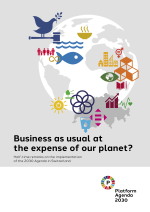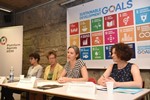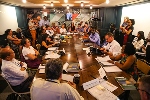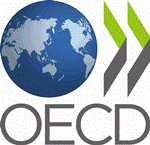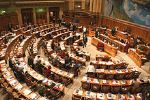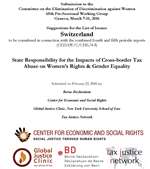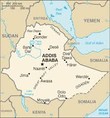Switzerland
Business as usual at the expense of our planet?
Published on Thu, 2022-07-28 17:53
Switzerland is not on course for a sustainable world. That’s the verdict from Platform Agenda 2030 in its new report “Business as usual at the expense of our planet? Half-time remarks on the implementation of the 2030 Agenda in Switzerland”. It is calling upon the Federal Council to show more leadership in the transformation needed to halve poverty, protect the climate and human rights, and hold the financial sector to account.
|
Published on Fri, 2019-03-15 12:13
The report on Switzerland by the NGO coalition Alliance Sud emphasizes the negative spillovers of policies: “Swiss foreign economic policy and its international financial and fiscal policy are still far from taking sufficient account of the requirements of the 2030 Agenda.” After a visit to Switzerland, UN Independent Expert on foreign debt and other financial obligations Juan-Pablo Bohoslavsky drew attention in a report to the Human Rights Council to deficiencies in the prevention of unfair financial flows and problems in the area of international corporate taxation: “The existing Swiss tax privileges for the foreign profits of multinational corporations ... create massive incentives for profit transfers to Switzerland and help to deprive developing countries of potential tax revenues in the hundreds of billions.”
|
Published on Mon, 2018-07-16 00:00
The experience of Voluntary National Reviews and of Civil Society shadow (or spotlight) reporting.
How it is key for meaningful participation and accountability
The side event "SDG Implementation at National Level: What’s the Point of National Reports?" was held on July 17 in New York, during the meeting of the High Level Political Forum of the UN. The debate focused on voluntary national reports (VNRs) and parallel “shadow” or “spotlight” reports generated by civil society organizations (CSOs) on progress towards the Sustainable Development Goals (SDGs).
|
Published on Tue, 2018-07-03 00:00
Swiss civil society – organized in the Platform Agenda 2030 – presented its report entitled «How sustainable is Switzerland? Implementing the 2030 Agenda from a civil society perspective».
Platform Agenda 2030 – Press Release of 3 July 2018
|
Published on Wed, 2018-04-11 14:43
Figures released on 10 April by the Federal Council show that Switzerland has clearly missed its own development assistance target. The country is thus moving further away from the international goal of allocating 0.7% of gross national income to development funding. While this allocation remained just about stable across OECD countries, in Switzerland it dropped from 0.53% to 0.46%. A hefty 14% contraction.
|
Published on Thu, 2017-04-27 16:05
To show that it takes the 2030 Agenda seriously, Switzerland needs to look at the damaging impact of its international financial and fiscal policies, argues Eva Schmassmann, from the Swiss coalition of development organizations Alliance Sud. "With over 3,000 billion USD of managed foreign assets, Switzerland – as a financial center – is the largest offshore haven in the world and one of the preferred low tax areas for global companies. Developing countries are losing billions in income that they could be using to implement sustainable development because of legal and illegal tax optimization techniques".
|
Published on Fri, 2016-11-18 09:52

SRF/swissinfo.ch
|
Also in Switzerland the "refugee crisis" is causing a stir. A few facts would be a useful input to this discussion.
"No one leaves home and family just like that. You must be so desperate that you are not even fazed by the thought of drowning in the Mediterranean. What matters is that you have tried to find a better life elsewhere and to avoid turning to crime, despite adversity."
|
Published on Fri, 2016-07-22 19:03
The negative impact on developing countries of the secrecy of the Swiss banking system, which encourages damaging tax evasion, corruption and illicit financial flows, was highlighted by civil society when Switzerland submitted its report about the 2030 Agenda to the United Nations. "Switzerland continues to host the largest offshore financial centre in the world" says the alternative report of Aliiance Sud. In 2015, Swiss banks administered foreign assets in the total amount of 2,300 billion francs.
|
Published on Fri, 2016-05-20 17:59
A few weeks ago the Finance Committee of the National Council moved for Switzerland's official development assistance to be reduced to 0.4% or even 0.3% of gross national income over the coming years. That would mean cutting expenditure on actual development cooperation abroad by 30% to 50%. Care of asylum seekers here at home, which Switzerland absurdly counts as development spending, would then account for one fourth to one third of this expenditure.
In the National Council itself, the Finance Committee's radical cost-cutting proposals will hardly find a majority. It transpires from centre-right circles, however, that a call will indeed be made for cost-cutting in long-term development programmes in order to release more funds for short-term emergency humanitarian aid. The call will also be for development cooperation to be more closely tied to Switzerland's own interests, namely to migration partnerships and agreements for the repatriation of asylum seekers.
|
Published on Tue, 2016-03-01 15:03
Tax avoidance and evasion represent a systemic drain on government revenues needed for the fulfilment of women’s rights and gender equality. As the international human rights system begins to grapple with the consequences of tax policy for human rights, a groundbreaking initiative is about to shine a bright light into the dark corners of financial secrecy.
Switzerland – arguably the world’s most important tax haven — may soon face scrutiny from the United Nations human rights system over its role in facilitating cross-border tax abuse. A coalition of civil society organizations has asked the Committee on the Elimination of Discrimination Against Women (CEDAW) — the UN body mandated to oversee compliance with governments’ legal obligations related to women’s human rights — to examine the extra-territorial impacts of Switzerland’s opaque financial legislation on women’s rights and gender equality, particularly in developing countries.
|
Published on Thu, 2016-02-04 16:09
The Swiss Parliament is discussing corporate tax reform III. In development policy terms, with this reform Switzerland is going from the frying pan into the fire.
For every US dollar a developing country gains, it loses more than two. A wide range of capital transfers help account for the constant drain of financial resources away from developing countries. According to calculations by Eurodad, the European Network on Debt and Development, developing countries lost US$1,583 billion in this way in 2012. That is more than 10 times the US$120 billion that flowed into developing countries in 2012 in the form of official and private development assistance.
|
Published on Wed, 2015-09-02 11:36

Photo: Raffael Waldner,
Tageswoche
|
Peter Niggli was honoured by the Swiss development community with a farewell party last August 27 in Bern, as he retired after 17 years at the helm of Alliance Sud, the Swiss coalition of development NGOs. Parliamentarians, government officials, journalists and NGO colleagues expressed their recognition. Speakers highlighted Niggli's contribution to the 2011 Swiss decision to increase ODA to 0.5% of GDP, which is a major step forward even if short of the 0.7 international target.
On behalf of the Social Watch network, of which Alliance Sud is the Swiss member, Roberto Bissio summarised Niggli's contribution as having taught a lesson in commitment.
|
Published on Thu, 2015-07-23 19:47

Peter Niggli
|
Climate change is costing us dear. Unless we rein it in, there will be more failed harvests, flooding in low-lying coastal areas, disease, mass migration and armed conflict over resources. Stopping it also comes at a price. It would mean completely switching energy generation, industrial production and transport systems to renewable energy sources – which is what the concept of climate protection means. Moderate estimates are that as of the year 2020, US$200 billion will have to be invested every year in emerging and developing countries. In addition, 50 billion would need to be invested annually in adaptation to climate change. This would include coastal protection systems for coping with rising sea levels, altering water courses or resettling communities in the countries affected, to mention but a few points.
|
Published on Mon, 2015-01-26 08:08
The Third UN Conference on Financing for Development will take place in Addis Ababa in July 2015. The key question will be how to finance the Sustainable Development Goals.
In September 2015 the UN will finalize the new global Sustainable Development Goals (SDGs). The political negotiations within the Open Working Group (OWG) have produced an ambitious catalogue of 17 main goals and numerous sub-goals, all of which focus equally on economic, social and environmental aspects of sustainable development. It is yet to be seen whether the goals put forward by the OWG will be watered down by the time the negotiations are over. Several countries have already announced their opposition to specific proposals.
|
Published on Thu, 2013-02-07 19:56

People demand clear rules
for Swiss corporations.
(Photo: Philipp Rohrer/Alliance Sud)
|
In some areas of its foreign policy, Switzerland does not earn the best marks for its contribution to the Millennium Development Goals. Its finance and trade policy is driven by self-interest and contributes to restricting the policy space of poor countries. Although Switzerland has substantially increased its development budget and pursues good pro-poor development cooperation by international comparison.
As a donor country Switzerland is bound primarily by the eighth Millennium Development Goal (MDG). This means that it should support the poorest countries in realising development goals 1 to 7 and adapt its trade policy and that of its financial centre to the needs of the poorest countries. Its endeavours towards a coherent, pro-development policy have also remained rather modest.
|
Published on Wed, 2012-08-08 15:41

Peter Niggli. (Photo: Swissinfo)
|
Conflicts on water all over the world responds to “the absence of recognized policy mechanisms and public institutions for managing water resources and allocating water in accordance with criteria that can be understood by the public” and can not be settled by market mechanisms, according to Peter Niggli, director of Alliance Sud, focal point of Social Watch in Switzerland.
|
Published on Thu, 2012-06-21 17:19

Photo: Philipp Rohrer/Alliance Sud
|
The "Corporate Justice" petition was signed by 135.285 people. This campaign urges the Federal Council of Switzerland and the Parliament to compel Swiss transnational corporations to respect human rights and the environment worldwide, reported Alliance Sud, focal point of Social Watch in the European country.
According to the campaign, subsidiaries of Swiss transnational companies such as Xstrata, Glencore, Syngenta, Nestlé, Danzer, Triumph and Holcim violate human rights or pollute the environment abroad, while there is no way for the parent companies to be held accountable.
|
Published on Mon, 2012-03-19 08:53
In terms of gender equity Switzerland is above the European average, but lags behind the Nordic countries and Spain.
|
|

